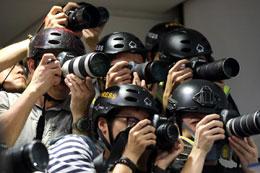Journalists under attack in Asia for doing their job

The biggest threat to Southeast Asian journalists’ safety and security is their workplace conditions, according to a survey by international journalists’ organizations.
The International Federation of Journalists (IFJ) said there were “too many journalists” who encountered direct attacks from both public and private individuals, adding that the many media workers were arrested for “simply doing their jobs.”
Initial findings of the poll— which included 1,265 journalists as respondents— also showed that 38 percent of survey subjects felt that media freedom in their countries has “worsened or seriously declined” in the past year.
It added impunity for crimes against journalists has reached “epidemic levels” in the region.
“Government and political leadership were the two biggest determinants of impunity for crimes against journalists, while the prevailing poor performance of the criminal and civil justice system to deal with such threats and acts of violence against journalists was a major contributing factor,” the statement read.
The survey, which was conducted in cooperation with the South East Asia Journalists Unions, focused on the on-ground situation in seven member countries, including Cambodia, Indonesia, Malaysia, Myanmar, Philippines, Thailand, and Timor Leste. Full poll results will be released on November 23, the anniversary of the Maguindanao massacre, which IFJ tagged as the “single deadliest attack on journalists in history.”
In the gruesome mass murder that shook the country in 2009, the corpses of more than 30 media workers were among those found buried in a shallow pit in the town of Ampatuan in Maguindanao province.
Only 116 of the 197 original suspects facing multiple murder charges over the Maguindanao massacre have been arrested. Of this number, 107 remain on trial while the cases against at least five suspects have been dismissed.
The new survey findings came days after the Philippines was tagged as one of the worst countries in prosecuting murders of journalists.
New York-based media watchdog Committee to Protect Journalists, in its Global Impunity Index, said the country is the fifth-worst nation for journalists in 2019.
In its preliminary findings, IFJ bared that the media safety rating in the Philippines was “poor.” It listed online harassment, attacks on workplace, and cyber-attacks as key safety threats for Philippine journalists.
The international organization likewise called on the Southeast Asian governments and authorities to take further action in enhancing the safety of media workers in the region.
Malacañang has previously maintained that press freedom in the Philippines remains robust.









